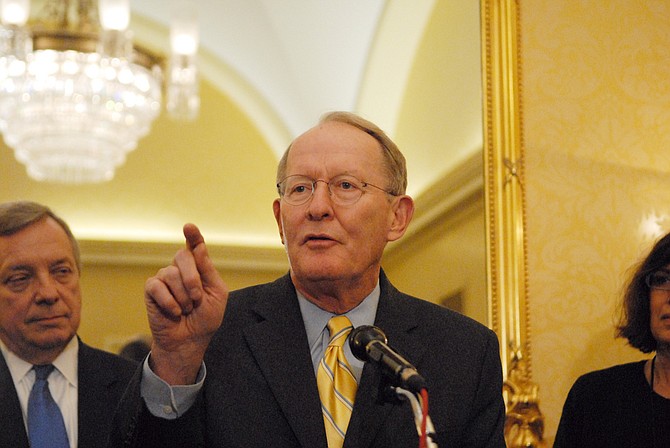The Republican chairman of the Senate health committee, Tennessee's Lamar Alexander, proposed bipartisan legislation extending for one year federal payments to insurers that help millions of low- and moderate-income Americans afford coverage. Photo courtesy Flickr/AMSF2011
WASHINGTON (AP) — Republicans showed signs Tuesday of reaching out to Democrats for a joint if modest effort to buttress health insurance markets, four days after the GOP effort to unilaterally uproot and reshape the Obama health care law crumpled in the Senate.
The Republican chairman of the Senate health committee, Tennessee's Lamar Alexander, proposed bipartisan legislation extending for one year federal payments to insurers that help millions of low- and moderate-income Americans afford coverage. President Donald Trump has threatened to halt those subsidies in hopes of forcing Democrats to make concessions, but the Senate's top Democrat on Tuesday called his moves "childish."
The No. 2 Senate Republican also seemed to suggest that the two parties seek common health care ground. Citing the Senate's "fragile majorities," Texas Sen. John Cornyn said on the Senate floor, "We are forced to work together to try to solve these problems, and I think frankly bipartisan solutions tend to be more durable."
In addition, Senate Majority Leader Mitch McConnell rebuffed Trump's demands that the Senate change its rules so it can pass a health overhaul with a simple majority vote. McConnell, R-Ky., said the Senate lacks the votes to end filibusters of legislation like Trump wants, and noted that getting the 60 votes needed to end filibusters wasn't why Republicans lost.
"It's pretty obvious that our problem with health care was not the Democrats. We didn't have 50 Republicans," McConnell told reporters.
The prospects for passing any bipartisan health care legislation remain uncertain, with divisions between conservatives and moderate Republicans persisting on several issues. In particular, Trump, McConnell and some other Republicans have mocked the payments Alexander wants to renew as a bailout for insurers.
Nonetheless, the day's comments collectively underscored the distance Senate Republicans are keeping from White House demands that they continue voting on repealing and replacing President Barack Obama's 2010 health care overhaul. Uprooting that law has been a top priority for Trump and most GOP congressional candidates, and failing to do it as they control the White House and Congress has angered many in the party.
Many top Republicans have said it's time for the GOP to move from health care to other issues.
McConnell said "there's still an opportunity" for Republicans to push health care legislation through the Senate alone. He said he was waiting for the nonpartisan Congressional Budget Office to estimate the impact of GOP bills easing some of the party's proposed Medicaid cuts, making it easier for insurers to sell bare-bones policies and simply giving states block grants for health programs.
Alexander said the legislation he envisions would be "small, bipartisan and balanced." He said it should include money to continue the insurance payments in 2018 plus provisions giving states more flexibility to improve health insurance policies, which he did not define.
He said his panel would hold hearings next month on stabilizing insurance markets. That would be a departure from the lack of hearings when McConnell worked behind closed doors to craft various versions of the GOP's health care bill, each of which were rejected by his Republican-run chamber.
Alexander said he's asked Trump to make the payments to insurers for August and September to give his panel time to write legislation. White House officials have said Trump will decide this week on the August installment.
Sen. Patty Murray of Washington state, the health panel's top Democrat, embraced Alexander's suggestions.
Trump has repeatedly threatened to cut off federal disbursements to insurers. They total $7 billion this year and are helping around 7 million people afford insurance deductibles and co-payments.
Obama's statute requires that insurers reduce out-of-pocket costs for many customers. But a federal court has blocked the federal reimbursements to insurers who do that, saying the funds have yet to be properly authorized by Congress. Trump and Obama before him have continued the payments temporarily.
The payments to insurers are backed by Democrats and some Republicans because many experts say that even the threat of blocking them is already prompting insurers to raise prices and consider abandoning some markets. Kristine Grow, spokeswoman for the insurance industry group America's Health Insurance Plans, said to cover their costs if the federal payments ended, insurers would have to boost premiums for people buying individual policies by 20 percent.
Senate Minority Leader Chuck Schumer, D-N.Y., said by withholding the money, the president would "impose a Trump premium tax" of 20 percent next year.
Last week, Trump tweeted that if the Senate didn't approve health care legislation, "BAILOUTS for Insurance Companies" would end "very soon!"
"His only stated reason is petty, is childish," Schumer said Tuesday. He added, "You don't hurt innocent people, Mr. President, when you lose politically. That is not presidential, that is not frankly what an adult does."
Copyright Associated Press. All rights reserved. This material may not be published, broadcast, rewritten, or redistributed.



Comments
Use the comment form below to begin a discussion about this content.
comments powered by Disqus